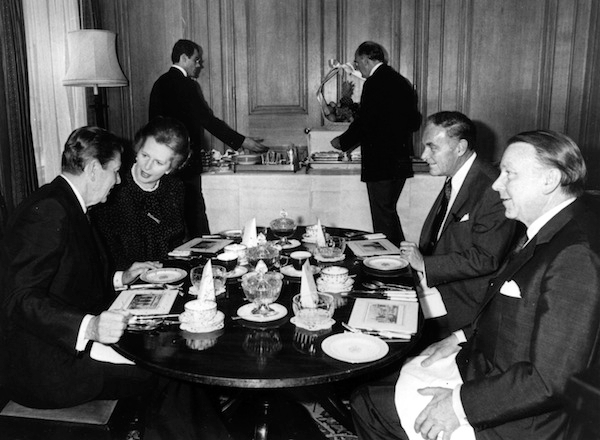It is impossible to think about anything else. Her death was more of a shock than a surprise. She had, alas, outlived the quality of life, so the immediate sadness is more appropriate to the human condition than to her own passing. But when such a mighty figure moves on, the world seems diminished.
Margaret Thatcher and drink: not an easy juxtaposition. She took little interest in any of life’s pleasures except work and she had little sense of humour. ‘Humour’ derives from the medieval humours, so a sense of humour ought to imply a balanced personality. There was nothing balanced about her: just as well. We should all give thanks for the lack of balance which enabled her to strike so relentlessly in pursuit of her objectives, all of vital national importance.
But telling her a joke was a hazardous business. You almost needed to signal that one was coming, as in leaving a motorway. Once, she was talking about Robert Conquest. He is a great man, who tried to alert the West to the horrors of the Soviet system when the likes of Eric Hobsbawm were still justifying it. Even so, Mrs T was banging on. To divert the flow, I said: ‘You know that Bob’s just got married for the fourth time?’ Puzzled expression: what had that to do with the Gulag? ‘And one of his friends said, “What are you doing marrying again at your age?” Bob replied: “I thought I’d have one for the road.”’ Not even a hint of a chuckle. Time to rejoin the motorway: ‘Of course, Prime Minister, you’re absolutely right…’
When nominally on holiday, she might be persuaded to take a hearty if brief interest in other people’s leisure activities. Once, staying with Alexander Hesketh, she went to the Towcester racecourse, which he owns, and was shown around the main stand. In those days, she moved with the speed of a silverfish. She darted ahead of her escort while exploring the hinder parts and came across the real ones, charging into the jockeys’ dressing room before anyone had time to shout a warning.
She would sometimes visit the Morrisons on Islay. The Lady was not a relaxed house guest. No question of slopping in an armchair with the papers, an interlude with green wellies and dogs, and then the first one before lunch. So her hosts proposed a picnic with William Astor on Jura. William had a formidable head stalker, Neil McInnes, a Highlander out of John Buchan. ‘I wouldnae mind a word wi’ Sir Edward Leithen. I dinna altogether agree wi’ his speech on the Canadian constitution.’ Neil set an inhuman, indeed Thatcherite, pace uphill, and he was one of the few people to have got the better of her. He was present at the festivities, and Mrs T made the mistaken assumption that she needed to put him at his ease. ‘I don’t suppose you often have excitements like this?’ ‘I’m no’ so sure about that, Prime Minister. We had Britannia in last week.’
Denis Thatcher liked a drink, though nothing like as much as in the caricature version. He shared a gift with his friend Bill Deedes, and with Churchill: all three could tipple away indefinitely without ever toppling. Denis was a gin and whisky man: neither Thatcher took much interest in the grape. Mrs T had to be dissuaded from serving English wine at Downing Street banquets. She too enjoyed whisky, and after she lost the premiership, there were reports that the enjoyment was growing. Alcohol and adrenaline are a volatile combination. Once out of office, the Old Girl was producing far more adrenaline than she could consume — and Peter Morrison was her PPS. To him, a small whisky was one which left something in the bottle.
Old age is not for cissies. But now that the frailty has ended as all frailty must, we should look back to her lioness years. One of the greatest women who ever lived, she bestrode this country like a warrior queen, reshaped our history and earned eternal gratitude. It is time to raise a glass to her memory.






Comments